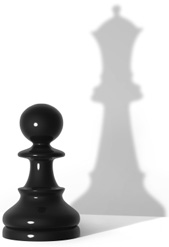December 2006
There is a story relayed in the book Introducing NLP by O’Connor and Seymour about Picasso. A stranger approaches him, and asks why he does not paint things as they really are.
 Picasso looks puzzled. “I do not really understand what you mean,” he replies.
Picasso looks puzzled. “I do not really understand what you mean,” he replies.
The man produces a photograph of his wife. “Look,” he says, “like that. That’s what my wife really looks like.”
Picasso looks doubtful. “She is very small, is she not?” And a little bit flat?”
The point is that every individual has a different experience of “reality”. Whatever the outside world is really like, we use our senses to explore and map it, and there are an infinite number of things we might perceive. Since we can only perceive a small portion of all that is out there, what decides which pieces of information we end up noticing?
It is our past unique experiences, culture, language, beliefs, values, interests and assumptions that dictate what we notice. Collectively, they filter all the potential things we might notice, and help us make meaning of our world. Thus, a hunter, an escaped convict, and a botanist each walking through the forest will have very different experiences and attend to very different things.
How does this idea relate to health and wellness?
“We can’t change the past, but we can change our memory of it.”
- Anonymous
Very narrow interests, unresolved traumatic experiences and limiting beliefs about how the world operates will make the world seem dull, dangerous and/or impoverished. If these filters are operating unconsciously, one acts in ways that sustain the underlying beliefs, and one becomes STUCK. This state then has a myriad of ways of presenting itself. Depression, anxiety, chronic dis-ease, inability to take ownership of one’s life, and addictive behaviors are some obvious examples, while apathy, uncertainty and a grumbling sense of dissatisfaction are more common, yet subtle ways of presenting.
How do we, as physicians, move beyond this challenge that faces our patients? Part of the answer lies in assisting others’ to expand their doors of perception. Patients need to be more aware of their deeper interests, to know what uniquely inspires them. They need to choose beliefs that create expansion, and uncover any hidden beliefs they have unknowingly adopted that stand in their way. They need to discover what language that they find motivating, and they need to direct their lives around their true values. By noticing what has not been noticed, patients can thus begin to make more informed decisions about their lives.
As health care facilitators, our role is vital. It is through efficient powerful questioning (and refusal to feed unhealthy ways of being) that we now have the opportunity to be a catalyst for growth. We can lead our patients through the doors of expanded perception, where they might find more exciting, flexible and healthy ways in which to operate.

 Mindfulness Programs
Mindfulness Programs Coaching
Coaching Physician Workshops
Physician Workshops